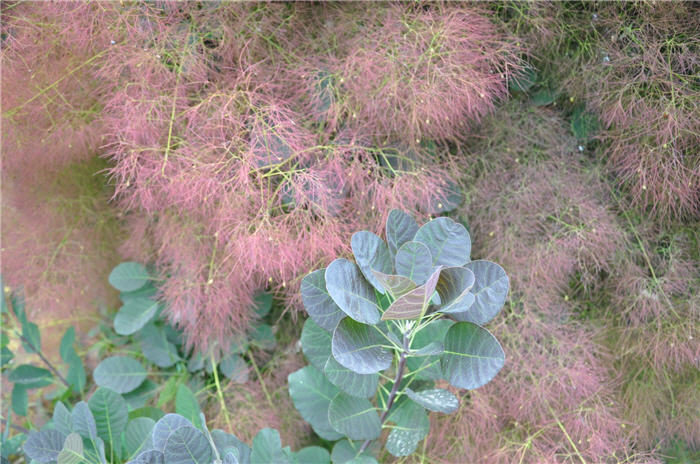| Botanical Name: Cotinus coggyria 'Velvet Cloak' | |
| Common Name: Velvet Cloak Smoketree |

-
Anatomy
-
Culture
-
Design
Plant Type
Tree, Shrub
Height Range
6-12'
Flower Color
Pink
Flower Season
Summer
Leaf Color
Blue Green
Bark Color
Grey
Fruit Color
n/a
Fruit Season
n/a
Sun
Full
Water
Medium, Extra in Summer
Growth Rate
Moderate
Soil Type
Clay, Loam, Rocky, Unparticular
Soil Condition
Average, Rich, Poor, Well-drained, Dry
Soil pH
Acid, Neutral, Basic
Adverse Factors
n/a
Design Styles
English Cottage, Mediterranean, Ranch, Spanish, Native Garden
Accenting Features
Fall Color, Multi-trunk Tree, Showy Flowers, Specimen
Seasonal Interest
Summer, Fall
Location Uses
Background, Shrub Border, Foundation, Patio, Walls / Fences
Special Uses
Screen
Attracts Wildlife
n/a
Information by: Stephanie Duer
Photographer:
Photographer:
-
Description
-
Notes
Velvet Cloak is another purple-leaved selection of Smoketree. It is deciduous, and grows around 10 to 15 feet tall and wide. New foliage is deep purple, turning a bronzy-purple-green in summer and orange in the fall. Plume-like seed heads form wispy, thread-like clusters of deep pink during the summer months.
Grow in full sun and well-drained soils; tolerates wide range of soils except wet, poorly-drained ones. Prefers somewhat infertile loams, but also does well in poor, rocky soils. Shallow fibrous root system makes it hard to grow anything but shallow-rooted groundcovers underneath. If bloom is not a concern, stems may be cut back hard in early spring each year to induce growth of vigorous new shoots with slightly larger than normal leaves. Such hard annual prunings will control size, but most likely at the expense of profuse flowering. Hard pruning is more often done on the purple-leaved cultivars as new foliage usually has the brightest color.